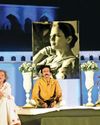As India celebrates its 72nd birthday, THE WEEK takes a look at how far we have progressed as a nation, and the challenges that still need to be addressed

In 1949, Jawaharlal Nehru recruited a physics professor to fix India’s fledgling economy.
It was not a bad call at all. The professor, Prasanta Chandra Mahalanobis, had graduated with distinction in mathematics and physics from King’s College in Cambridge, was teaching at Kolkata’s Presidency College, and was a much-feted fixture in Bengal’s bhadralok circles. A connoisseur of literature and arts, Mahalanobis lived in a rambling mansion in Barrackpore, famous as Rabindranath Tagore’s favorite hideaway in Kolkata. The duo was apparently so close that the professor knew more about the poet’s canon than the poet himself did.
“Mahalanobis combined fluency in Sanskrit philosophy and Bengali literature with acrobatic ability in physics and statistics,” wrote the historian Sunil Khilnani in The Idea of India. “Intellectually, he was an awesome polyglot, the kind of man for whom Nehru was guaranteed to fall.”
Mahalanobis was also inquisitive, analytical and adventurous—qualities that prompted prime minister Nehru to summon him to Delhi and entrust with him with the task of planning India’s economic development. “I had only a very vague idea of planning when I first came to Delhi,” Mahalanobis said five years after he took the job. “From 1950, when I first started handling national income data, I began to learn.”
A quick learner, he started the world’s most audacious data-gathering exercise a year after he came to Delhi. For three years, he despatched thousands of government officials to the far corners of India to learn about how people lived, how they earned their livelihoods, the things they bought and traded, the money they saved, and so on. The National Sample Survey, which was thus completed in 1953, was the biggest household survey in history, and it rightly caught the attention of economists worldwide.
Diese Geschichte stammt aus der August 25, 2019-Ausgabe von THE WEEK.
Starten Sie Ihre 7-tägige kostenlose Testversion von Magzter GOLD, um auf Tausende kuratierte Premium-Storys sowie über 8.000 Zeitschriften und Zeitungen zuzugreifen.
Bereits Abonnent ? Anmelden
Diese Geschichte stammt aus der August 25, 2019-Ausgabe von THE WEEK.
Starten Sie Ihre 7-tägige kostenlose Testversion von Magzter GOLD, um auf Tausende kuratierte Premium-Storys sowie über 8.000 Zeitschriften und Zeitungen zuzugreifen.
Bereits Abonnent? Anmelden

The female act
The 19th edition of the Qadir Ali Baig Theatre Festival was of the women and by the women

A SHOT OF ARCHER
An excerpt from the prologue of An Eye for an Eye

MASTER OF MAKE-BELIEVE
50 years. after his first book, Jeffrey*Archer refuses to put down his'felt-tip Pilot pen

Smart and sassy Passi
Pop culture works according to its own unpredictable, crazy logic. An unlikely, overnight celebrity has become the talk of India. Everyone, especially on social media, is discussing, dissing, hissing and mimicking just one person—Shalini Passi.

Energy transition and AI are reshaping shipping
PORTS AND ALLIED infrastructure development are at the heart of India's ambitions to become a maritime heavyweight.

MADE FOR EACH OTHER
Trump’s preferred transactional approach to foreign policy meshes well with Modi’s bent towards strategic autonomy

DOOM AND GLOOM
Democrats’ message came across as vague, preachy and hopelessly removed from reality. And voters believed Trump’s depiction of illegal immigrants as a source of their economic woes

WOES TO WOWS
The fundamental reason behind Trump’s success was his ability to convert average Americans’ feelings of grievance into votes for him

POWER HOUSE
Trump International Hotel was the only place outside the White House where Trump ever dined during his four years as president

DON 2.0
Trump returns to presidency stronger than before, but just as unpredictable